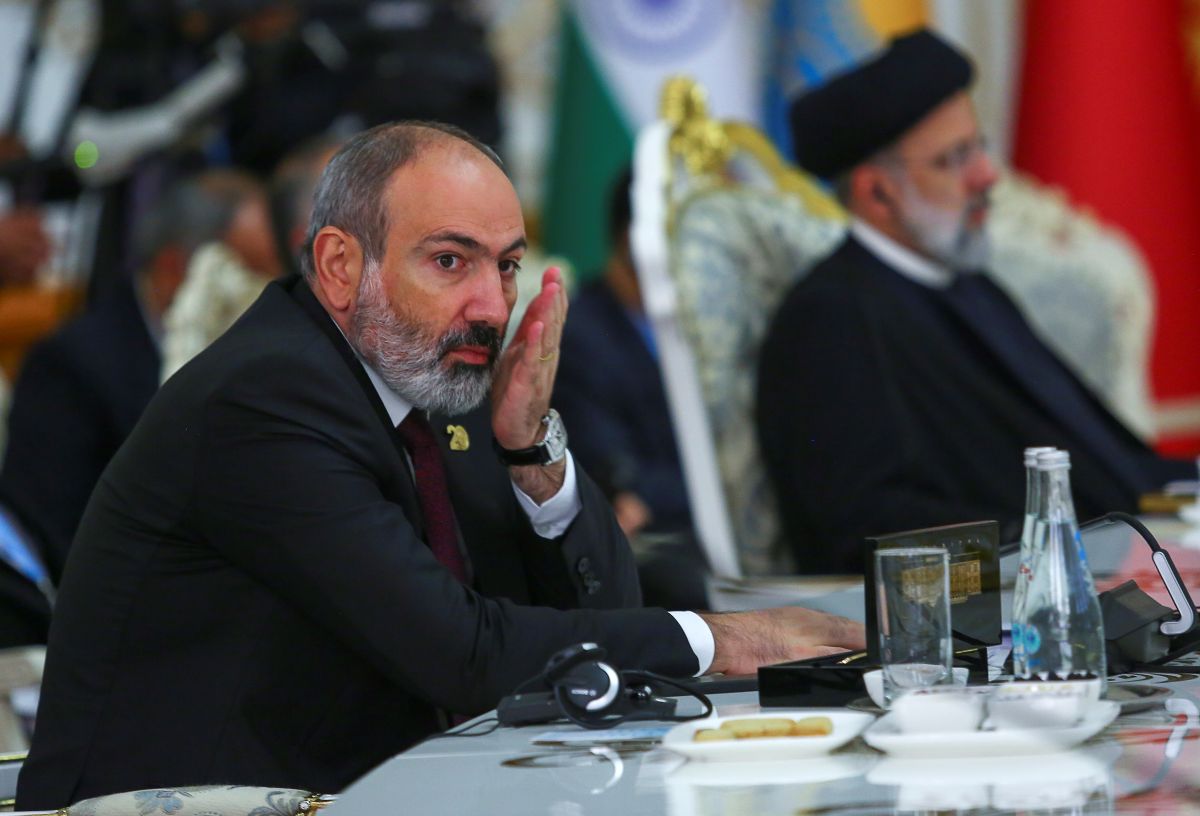Prospects for the Normalisation of Turkish-Armenian Relations
The leaders of Turkey and Armenia announce an attempt to establish diplomatic relations and open borders. Success would be beneficial for both countries: it would strengthen Turkey's influence in the Caucasus, and it would enable Armenia to break the regional isolation. However, success remains unlikely due to nationalist sentiment in both countries and the possibility of Russia and Azerbaijan sabotaging the talks.
 Photo: Didor Sadulloev/Reuters
Photo: Didor Sadulloev/Reuters
Armenian Prime Minister Nikol Pashinyan and Turkish President Recep Tayyip Erdoğan have announced that the two states will attempt normalisation for only the second time in their history. The states do not maintain diplomatic relations with each other, and the Armenian-Turkish border has been closed since 1993. At that time, Turkey blocked it over the occupation by Armenian forces of part of the territory of Azerbaijan, a Turkish ally, during the war between those countries. In 2008-2010, the respective presidents at the time of Turkey and Armenia, Abdullah Gül and Serzh Sargsyan, made diplomatic attempts at normalisation, which were unsuccessful. Turkey withdrew from the talks under pressure from Azerbaijan, which demanded Armenia return the occupied territories, and Armenia pulled out because of pressure from its public and diaspora, which demanded that normalisation be linked to Turkey recognising the Armenian genocide in 1915.
Factors Favouring Normalisation
The chances today of a successful track are greater than in the past decade, for many reasons. For Armenia, normalisation of relations with Turkey and the reciprocal opening of borders would mean a way out of regional isolation, which would in turn reduce the country’s economic dependence on Russia. This would also enable it to reduce its logistical dependence on Georgia and Iran, which are Armenia’s only land transport corridors besides the closed borders with Turkey and Azerbaijan. In the long term, the Pashinyan administration sees an opportunity to increase Armenia’s room for manoeuvre in terms of foreign policy and in the conflict with Azerbaijan over Nagorno-Karabakh (NK) in normalising relations with Turkey. Pashinyan counts, among others, on greater Turkish-Armenian economic cooperation leading to Turkey easing its military and political support for Azerbaijan, for example, in a final settlement of the diplomatic status of the NK.
As for Turkey, the main factor that enables the normalisation talks is the changed circumstances after the armed conflict in the NK in 2020. Since it resulted in a clear victory for Azerbaijan, enabled by its Turkish ally, decision-makers can claim that the fundamental barrier blocking the dialogue with Armenia throughout the years had been removed. Normalisation also would serve as an opportunity for Turkey to strengthen its position in the South Caucasus, a region essential for the development of its broader strategy towards Asia. Not only would it allow Turkey to expand its economic influence and increase its control over regional transport corridors but also it would reinforce its instruments of influence on Russia and Iran. This is particularly important in light of two circumstances of Turkish foreign policy, the first being the tensions in relations with Russia and Iran, especially visible after the NK conflict, and the second Turkey’s efforts to prove to its Western allies that the state can still be a reliable ally. Normalisation has been on Turkish decision-makers agenda since Joe Biden’s victory in the U.S. presidential elections, accompanied by a narrative that Turkey is the only country effectively holding back Russia’s imperialist policy in the European neighbourhood.
Barriers to Normalisation
Pashinyan’s efforts are limited by analogous factors that prevented him from successfully completing the peace process with Azerbaijan undertaken in 2018-2019. The long-term identity policy of all Armenian authorities has shaped an antagonistic attitude towards Turkey in Armenian society. As a result, Armenians living in the country and a large part of the diaspora associate the normalisation of relations with Turkey with the need for the Turkish authorities to recognise the 1915 Armenian genocide, change their policy towards Armenian cultural heritage in Turkey, and even express revisionist postulates of returning to Armenia part of the eastern part of Turkey. These attitudes were deepened as a result of Turkey’s involvement in the conflict over the NK on Azerbaijan’s side in 2020. Pashinyan’s opposition among the Karabakh clan consolidated after the parliamentary elections in 2021 and is exerting political pressure on him, demanding both the cessation of diplomatic talks with Azerbaijan and Turkey (treated as high treason) and an armed settlement of the conflict with Azerbaijan (Turkey’s ally).
The position of the Turkish authorities towards the 1915 events on the international forum will most likely be less confrontational after the U.S. president called it a genocide. Biden’s statement makes the Turkish negationist campaigns, which have had coarsened relations with Armenia, lose their meaning. However, it is still unlikely that the Turks will meet the Armenian demands. Not only would this have legal and financial consequences such as compensation for victims’ families and property restitution, but also it would be a major shock to the Turkish public. That would entail a political cost for policymakers, which is unacceptable in light of their close alliance with the nationalists since 2015.
Regional Restrictions
Russia’s interest is to counteract Turkish-Armenian normalisation because it would limit Russian influence in the South Caucasus. The opening of the Turkish-Armenian border would also undermine Russia’s role as the guarantor of the functioning of transport corridors between Turkey and Azerbaijan, which are to be created based on the truce conditions on the NK of 10 November 2020. Normalisation would potentially allow land transport between Turkey and Azerbaijan via the territory of Armenia, but using alternative routes. Therefore, Russia may attempt to sabotage the ongoing Turkish-Armenian talks and prevent them from reaching an agreement by destabilising the internal situation in Armenia (e.g., by sparking protests after arbitrarily raising gas import tariffs), increasing support for the opposition, or threatening to limit Russian military presence in Armenia. Even if Armenia and Turkey reach an agreement on the opening of the borders, Russia has instruments to control and restrict transit traffic through Armenian territory, including the presence of Russian border guards and Federal Security Service officers on the Turkish-Armenian border.
Normalisation of relations between Turkey and Armenia also would be detrimental to the Azerbaijani authorities, who are instrumentalising the Azerbaijani-Armenian conflict and the Azerbaijani-Turkish alliance for domestic policy purposes. Although Azerbaijan achieved strategic goals in the NK as a result of its victory in the conflict last year, the Azerbaijani-Armenian conflict has not ended, both countries are at war, and Armenia is recognised by Azerbaijan as the main threat to security. In view of the conclusion on 15 June this year of the “Shusha Declaration”, establishing a military alliance between Turkey and Azerbaijan, the Azerbaijani authorities could trigger an escalation of armed clashes on the Armenian-Azerbaijani border to force Turkey to back away from reconciliation with Armenia.
Conclusions and Prospects
Normalisation between Turkey and Armenia remains unlikely since key internal and regional constraints have not yet been removed. As long as both countries do not eliminate at least some of these obstacles, the talk about normalisation should be considered primarily propaganda, especially in Armenia’s case, where the government has been unsuccessfully trying to demonstrate any success in foreign policy since taking power in the country in 2018.
Normalisation would be beneficial from the perspective of the EU and Poland as it would limit Russian policy in the Caucasus, which is based on the instrumentalisation of conflicts between Armenia and Turkey/Azerbaijan. However, it would require greater cooperation between the EU and Turkey to effectively implement Union policy in the Caucasus. The EU and Poland have limited instruments to increase the chances of success of the normalisation process or to strengthen trust between the parties. Therefore, an attempt to support Turkish-Armenian normalisation, given the high risk of failure of this process, could further weaken the EU’s influence in the countries of the South Caucasus and Turkey.


